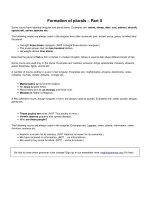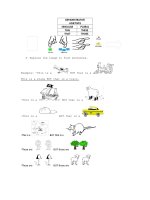Puzzling Plurals
Bạn đang xem bản rút gọn của tài liệu. Xem và tải ngay bản đầy đủ của tài liệu tại đây (168.81 KB, 6 trang )
163
Puzzling Plurals
C
HAPTER
7
Puzzling Plurals
163
We do a good job using the correct singular and plural forms
of most nouns, because the process isn’t tricky; you just add an
“s” or an “es” or an “ies” to make the plural form. But a few
words that come to us from Latin and Greek don’t follow the
normal pattern. As a result, their singular and plural forms are
often confused or unknown.
76. Media
Don’t Say: The media is protected by the first
amendment.
Say Instead: The media are protected by the first
amendment.
Here’s Why:
It hardly seems fair that a dead language
causes trouble for us in English. “Media” is plural, of Latin
origin, referring to a group of vehicles through which ideas are
communicated. The singular form is “medium.” So in the ex-
ample sentence, when we use the plural form “media,” we
need to follow it up with the plural verb “are” instead of the
p Bad Grammar Ch 07.pmd 3/17/2004, 9:46 AM163
164
When Bad Grammar Happens to Good People
singular one, “is.” There is one case in which many usage ex-
perts are comfortable treating “media” as singular, and that is
when the group of vehicles is being referred to as a collective,
as in The media has become an institution just like the gov-
ernment. However, you can avoid having to figure out whether
a singular sense is acceptable or not simply by treating “media”
as plural in every case—then you’ll always be correct. Con-
versely, when you’re referring to just one of the vehicles through
which communication happens, remember to use the singular
form, “medium.” Here are some correct examples of each:
His preferred medium has been newspapers, but I hear
he’s interested in television now.
His preferred
media have been newspapers and
magazines.
The
media work overtime when there’s a big story.
The artist’s
medium was pen and ink.
The artist works in mixed
media.
There has been a trend lately toward making a plural out of
the word “medium” by simply adding an “s” to get “mediums.”
One sees this in print from a range of sources, some downright
respectable. For example, you might read, He used several
mediums to reach his audience. However, this is a recent
trend, and most well-spoken folks have been carefully edu-
cated that “media” is the plural of “medium.” So you would be
better off sticking to that traditional distinction if you want to be
sure that your listeners or readers know you know what’s right.
77. Data
Don’t Say: The data shows our plans have failed.
Say Instead: The data show our plans have failed.
Here’s Why:
“Data” and “datum” work just like “media”
and “medium.” The “a” ending is plural; the “um” ending is
singular. The only difference between the two examples may
p Bad Grammar Ch 07.pmd 3/17/2004, 9:46 AM164
165
Puzzling Plurals
be this: The use of “data” as a singular goes down a little easier
with usage experts than the use of “media” as a singular. And
that’s because facts often seem to travel in packs—so scientists
and researchers typically think of data as a collective term. The
bottom line is this: You’ll always be correct if you treat data as a
plural. But when your meaning is focused more on the string of
facts taken together as a group, using “data” with a singular verb
won’t get you thrown in jail. It’s a judgment call. Here are addi-
tional correct examples of the plural sense of “data”:
The data are inconclusive, so we’ll need another study.
The
data indicate that Ellen’s hypothesis was right.
The new
data make the previous research obsolete.
78. Alumni
Don’t Say: Jim and Judy are both Michigan alumnis.
Say Instead: Jim and Judy are both Michigan alumni.
Here’s Why:
Another term from Latin: This one has sev-
eral forms you should know. One male graduate is an “alum-
nus.” Two or more male graduates are “alumni,” pronounced
with a long “i,” and never, ever, with an “s” at the end, as in the
incorrect example. Two or more graduates of different sexes
are also called “alumni,” as in our corrected example. One
female graduate is called an “alumna,” and two female gradu-
ates are referred to as “alumnae,” spelled with an “ae” at the
end, but rhyming with “knee.” An example of each are:
Geraldine is an alumna of Grinnell College.
Lucy and Beth are Sarah Lawrence
alumnae.
Don is an
alumnus of Lincoln High.
Joe and Fred are
alumni but they don’t donate money
to the school.
Stacy and John are both
alumni, but she’s the only
one going to the reunion.
p Bad Grammar Ch 07.pmd 3/17/2004, 9:46 AM165
166
When Bad Grammar Happens to Good People
79. Criteria
Don’t Say: Sense of humor was her only criteria in choos-
ing a man.
Say Instead: Sense of humor was her only criterion in
choosing a man.
Here’s Why:
“Criteria” is the plural of “criterion,” a word
of Greek origin that means “standard” or “measure.” In this
sentence, the woman has only one measure by which she judges
men acceptable or not, so we should use the singular “crite-
rion,” and wish her the best of luck. Separately, remember to
use a plural verb whenever “criteria” is your subject. For ex-
ample, it’s the criteria are and not the criteria is. Additional
correct examples are:
The snooty club’s board of directors established a list
of 60 criteria for membership.
He’s such a simple man that his
criterion for happi-
ness is having enough ice for his soda.
Julie asked what the opera company’s
criteria were
for screening chorus members.
Is looking good in red really a fair
criterion for this
job?
80. Phenomena
Don’t Say: Incredible phenomenons happen all around us
every day if you know where to look.
Say Instead: Incredible phenomena happen all around us
every day if you know where to look.
Here’s Why:
“Phenomenon,” which also comes to us from
Greek, means an event that is observed through the senses
rather than by thought. The plural form is “phenomena” not
“phenomenons.”
p Bad Grammar Ch 07.pmd 3/17/2004, 9:46 AM166
167
Puzzling Plurals
81. Memoranda
Don’t Say: I typed memorandums today until my fingers
cramped up.
Say Instead: I typed memoranda today until my fingers
cramped up.
Here’s Why:
Okay, so you probably don’t use the full
word every day; you just say “memo” or “memos” instead.
And that’s fine. But when you do use the full word, remember
that the plural form of “memorandum” is not “memorandums,”
it’s “memoranda.”
Test: Puzzling Plurals
Please circle the correct choice.
1. The mayor responded to the charges by complaining that
the media (was, were) ganging up on her.
2. Our consumer preference data (reveal, reveals) that al-
most no one would buy a cereal called “Mothball Crunch.”
3. Buffy and Babs, who are (alumnis, alumni, alumnae, al-
ums) of a fine finishing school, have joined a motorcycle
gang.
4. Yes, Donald and Ivana are (alumnis, alumni, alumnae,
alums), but they’ve never given the school a dime.
5. To get insurance from that company you must meet two
simple (criterion, criterions, criteria): you can’t have an ac-
cident on your record, and you must promise never to have
one.
6. The algebra teacher’s only (criterion, criterions, criteria)
for giving an A was perfect punctuation.
7. Toby came to work on time today for the first time ever; do
you know the reason for this extraordinary (phenomenon,
phenomenons, phenomena)?
p Bad Grammar Ch 07.pmd 3/17/2004, 9:46 AM167









